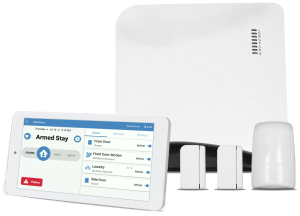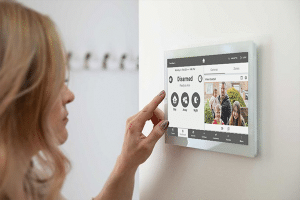Your cart is currently empty!
Category: General
-

The EMC Security Difference
The number 1 question people ask is: What makes EMC Security different than other companies?
1. No Contracts!
It should be no surprise that the biggest difference is that we don’t require a monthly service contract. You can cancel anytime for any reason.
You can’t purchase another professionally installed security system without agreeing to at least a 36-month contract. This practice has been the standard for years so the providers can offer low up-front installation and equipment fees. The problem with this is once the equipment costs would be paid off, the high monthly fee (absorbing the equipment costs) does not reduce.
Since our inception in 1998, EMC Security has offered no-contract monitoring service. You pay for your equipment upfront with monitoring and communication charges paid on a month to month basis, with the option to cancel any time. If you need to finance the equipment, we have an interest-free option for that as well.
2. Security Technology
EMC Security sells a variety of security equipment . All the equipment is non-proprietary which means that other companies can reprogram it for their monitoring system. Some well-known, national companies do not sell this type of technology, preferring instead to use their own proprietary equipment, blocking other companies from monitoring the systems. This trend is unfortunately one that locks customers in as well, because the system is worthless if you are not happy with the monitoring service.
3. Takeovers
We can also takeover and monitor pre-existing systems. So, if you have a system in your home, we should be able to reprogramme it, provide any updates or upgrades needed, and start monitoring. This service can save a customer alot of money.
4. Alarm Monitoring
We believe everyone should be able to afford to be safe at home, so we keep costs low. Most notably though is our Secure Path Technology. No matter what extra features a home security system offers, the bottom line is whether someone is monitoring your home 24/7 and can get help to you fast when you need it most.
EMC Security pioneered a monitoring architecture that sends a signal simultaneously to two, separately staffed, UL listed, CSAA Five-Diamond Certified command centers, which means a highly trained operator will always be available to answer the call. With an average response time of 14 seconds, homeowners have the added peace of mind that comes with rapid response.
Most security providers utilize a single command center that requires rerouting in the event the first center is busy or otherwise disabled, wasting time and creating unnecessary risk.
Additionally, security technology is built with an “alarm signal delay” of at least 45 seconds. EMC Security overrides this delay so the signal is transferred to our monitoring centers immediately. A lot can happen in 45 seconds and we don’t want to take that chance when lives are at stake.
5. Customer Service
Finally, what separates EMC Security from the rest is our ownership and values. Because we are owned by three of the largest non-profit power companies in Georgia, we are able to keep costs down and focus on service.
Like our parent companies, we put customer satisfaction above everything else because we know that happy customers are key to maintaining a successful business. By endorsing highly ethical business practices, both within our organization and across our customer and potential customer base, we send our message as a standard, not as a fallback.
This is very important when the lives of our customers are at stake.
-

Your Guide to Buying Home Security
Purchasing a security system to protect your home and family can be confusing. There are many options. Every home is different and individual needs vary. It’s not easy to sort through the information to get a clear idea of what you need to get up and running.
This guide can help.
We’ll outline the different ways in which you can purchase home security with EMC Security, depending on your home and what security equipment currently exists, including:
- Starting from scratch with a new security system
- Fine-tuning the current system in your home
- Powering up the current system in your home
STARTING FROM SCRATCH?
OPTION 1: PROFESSIONAL INSTALLED SYSTEM

No security equipment? Do you prefer a professional to install the equipment? Are you considering the addition of home-automation or security cameras?
KICK BACK AND LET EMC SECURITY INSTALL IT FOR YOU
What Do I Need? The type of system and components will depend on the construction of your home, your particular needs (security, fire, cameras, automation, etc.), and lifestyle (children, pets, etc.).
Hard-Wired vs Wireless. A hard-wired system connects all devices to the control panel via wires. Wireless systems connect via radio frequency, using minimum wiring.
Communication Method. You can connect to our monitoring centers via phone line, internet, or cell towers. Cellular is the most reliable since it does not rely on a power source to communicate.
Cameras & Automation. Interactive controls, cameras and home automation can be added to most security systems for a complete smart-security system, controlled from your mobile device.
What’s the Process? Contact us at 770.963.0305 to schedule an in-home evaluation to determine what equipment is needed.
In-Home Technician. At this appointment, the system will be installed and tested, interactive services will be applied and the homeowner will be fully trained on system operation.
OPTION 2: DIY SELF-INSTALLED SYSTEM
 No security equipment? Do you want the latest, most advanced wireless/portable technology? Do you want to use interactive mobile controls and home-automation?
No security equipment? Do you want the latest, most advanced wireless/portable technology? Do you want to use interactive mobile controls and home-automation? IS THE DO-IT-YOURSELF SECURITY SYSTEM RIGHT FOR YOU?
Advanced Technology. Wireless DIY security is the hottest security product on the market. Everyone loves its ease of use, convenience, affordability, effortless home-automation, and interactive features.
Wi-Fi Communication. DIY Self-Install systems communicate to our monitoring centers via Wi-Fi technology with a cellular option.
Cameras & Automation. The DIY system is the hub for home automation devices and cameras that integrate to your security and are controlled via one mobile app.
All the Heavy Lifting. Is done. We’ll program and label each device specifically for your home, so all you have to do is open the box, peel and stick the equipment in place, plug it in, connect to your Wi-Fi, and go.
Where to Buy. The DIY system can be purchased either by visiting emcsecurity.com or by contacting us at 770.963.0305.
Beware of Imitations. Don’t be led into a false sense of security. Never purchase a system from a company that does not require 24/7 professional monitoring, nor provide technical support.
HAVE A SYSTEM? FINE TUNE AND UPGRADE
SECURITY SYSTEM CONVERSION
Is your security system looking a little worn-out? Does it need special treatment or updating?
REPLACE OR MODIFY YOUR EXISTING SYSTEM COMPONENTS
What’s a Conversion? Replacing or modifying the control panel and keypad(s) of an existing security system. Door/window sensors, motion detectors, wiring, and smoke detectors may or may not need to be replaced.
Why Do I Need This? Some systems do not accept a simple reprogramming because of proprietary equipment specific to a ertain alarm company. Therefore, it’s necessary to replace the control panel and keypad(s).
What About Updates? Some systems may not necessarily require a conversion but the customer chooses a conversion to upgrade to newer technology.
Examples and Ideas.
- Upgrade to a touchscreen keypad
- Revise communication method
- Integrate security cameras
- Add home-automation and interactive services
What’s the Process? Contact us at 770.963.0305 to schedule an in-home appointment to inspect the security system and determine your needs.
In-Home Technician. At this appointment, the conversion will be completed and tested, interactive services will be applied and the homeowner will be fully trained on system operation.
HAVE A SYSTEM? POWER-UP WHAT YOU’VE GOT
SECURITY SYSTEM TAKEOVER
 Is your security system ready to go? Is it in crime-fighting shape and just needs to be activated?
Is your security system ready to go? Is it in crime-fighting shape and just needs to be activated?REPROGRAM YOUR SYSTEM SO EMC SECURITY CAN GET TO WORK
What’s a Takeover? Reprogramming an existing functional security system to allow for a change in monitoring companies.
Why Do a Takeover? A takeover is the most affordable way to switch monitoring companies. If you are searching for a great value you aren’t getting now, switching to EMC Security may be the answer.
What’s Included?
- A full system diagnostic
- Reprogamming & testing
- Battery replacement if needed
- Training on system operation
- EMC Security yard signs and stickers
What’s the Process? Just give us a call at 770.963.0305. We’ll determine if your system can be reprogrammed, go over the details, and schedule the takeover appointment.
EMC Security Difference.
- No-Contract option
- Response averaging 14 seconds
- New EMC Group Chat Notification
Contact EMC Security. 770.963.0305 | emcsecurity.com
-
How to Reuse Your Current Security Equipment
Switching to a better home security monitoring service is called a system takeover.
The benefit is that—if it’s relatively modern and compatible—you can keep the equipment you already own rather than buy a completely new system.
How does a system takeover work?
In most cases, it’s fairly straightforward to use your existing security system and switch to a new alarm monitoring company.
It’s important to speak with your new alarm monitoring company to determine if your current system is compatible with their monitoring center.
- For example, when you call EMC Security, the main details we’ll review the type of equipment currently in place (and may ask you to text an image of your keypad) and discover if you want to add or upgrade any components. This might be a good time to upgrade to a touchscreen keypad or add security cameras.
- Once we get a good sense of your situation, we’ll send one of our trained technicians to your home to reprogram your system and make any changes requested or required.
If your system is not currently compatible with EMC Security, but is not locked out due to proprietary equipment, we’ll suggest a conversion to replace the “brains of the system” so it can communicate reliably with our central monitoring station.
- While this option is not as inexpensive as a takeover, it can be quite less expensive than replacing the entire system.
If you want the best security company in your area, we encourage you to shop around and ask your sales rep the right questions. Spending those few extra minutes to understand your security company will save you a lot of headache and disappointment down the line.
Want to learn more about security systems before you make a decision? Contact us at 770-963-0305 and we’ll answer any questions you have.
-

Why a proprietary alarm is a thumbs down
Would you be happy purchasing security equipment from a company and being stuck using their service exclusively, even if the service is poor or the price keeps increasing?
It could happen, especially if you purchase ADT, Xfinity (Comcast), or Simplisafe security equipment. Simplisafe and Xfinity even claim a benefit of not requiring a monthly contract. But the fact is, if you aren’t happy with their service, you’ll need to throw the equipment in the trash – because no other company can take it over and monitor it. Their technology is proprietary.
These companies make their proprietary equipment quite attractive with huge sales or “free” equipment.
But that comes at a cost:
- A lengthy contract that rolls the equipment cost into the monthly payment
- No way out because no other company can take it over
Let me ask the obvious question:
If the company locks you into a monthly contract or locks other companies out of monitoring the equipment, what incentive do they have to offer you good service once the sale is complete?
The answer is simple – They have no incentive.
For these reasons, EMC Security gives proprietary equipment a thumbs down. We want our customers to CHOOSE to do business with us. That’s why we give them the freedom to cancel at anytime for any reason – with no penalty. The equipment is non-proprietary so many companies can monitor it.
Click here to schedule a quick, easy takeover today.
-

Why Do Self-Install Security?
EMC Security launched a line of self-install security systems a few years ago.
Today, our DIY systems are the most popular, and most affordable systems we offer.
We acknowledge that consumers can be a little hesitant when it comes to installing their own system – because it’s something that hasn’t been offered until lately. But just like anything else, once they experience it, they realize there was nothing to fear.
Advanced technology has made DIY systems easier than ever to set-up. But even more importantly, once the system is set-up, DIY systems are easier than ever to use day in and day out.
Who is Self-Installing?
Over half of consumers that acquired a security system (51%) in the past 12 months self-installed their system, according to Parks Associates’ report, DIY Disruption: Smart Products and Home Security.
Why Self-Install?
1. Reduce Cost
Many of these consumers find the cost savings of DIY systems highly attractive — 48% of those who self-installed their system did so to save money,” says Dina Abdelrazik, senior analyst, Parks Associates. “Current self-install security solutions are designed from the ground up to be installed by the consumer.”
2. It’s Convenient
Additionally, just as many reported that they like the convenience that a self-install system provides: no installation appointment, no waiting for installers, and no privacy lost from installers coming into the home.
3. Set-up is as Easy as They Say
The research also confirms that DIY systems are in fact as easy to install as they claim. “DIY security systems are easy to install, can make the consumer feel safe, and provide peace-of-mind value while delivering cost savings.”
Parks and Associates is an internationally recognized market research and consulting company specializing in emerging consumer technology products and services.
-
Before You Buy a Security System – Watch This Video
Want to learn more about the security system that’s right for you before you make a decision?
Contact us at 770-963-0305 and we’ll answer any questions you have.
-

Insurance Benefits From A Security System
There are many incentives to having a security and or fire monitoring system installed in your business or home. Obvious ones include 24/7 watch over your possessions and loved ones, and peace of mind.
But many people don’t realize that spending the money upfront to get a system installed can ultimately save money in the long run through insurance discounts.
Insurance Benefits
Insurance companies like to stack the deck in their favor. For instance, a healthy person is more likely to have cheaper premiums because they are at less risk of a health episode. The insurance company rewards the person with cheaper prices because the person is less likely to use the insurance.
The same goes for home and business owners. You can receive up to a 20% discount on your homeowners or business insurance policy by installing a security or fire system in your property.
A study conducted by the UNC Charlotte concluded that 60% of would-be burglars wouldn’t break into a home if they knew it had an alarm system. Insurance companies look at these statistics and see the potential of a potential break-in significantly drops when a property has the protection of a security alarm monitoring system. Thus, the insurance company rewards the person with a discount, because this ultimately helps the insurance company. It’s a win-win for both parties.
Consider this scenario:
- Your policy is $428, or $36 dollars a month.
- With a 20% discount, you’ll save $85, or $7 a month.
- You can look at it like your new policy costs $343, or $29 dollars a month.
That might not seem like a lot now, but over a ten year period, you’ll have saved $850 dollars on your policy. That is a substantial amount. Free money is free money. You should take advantage of these potential savings.
Additional Benefits of Having a Security & Fire Alarm System
According to the Insurance Information Institute, Fire accounted for 11.1 billion dollars in property damage in 2018. That was the result of 499,000 structure fires that year. Fires can happen anywhere at any time.
The benefits of having a fire alarm monitoring system can’t be ignored. A fire alarm system provides 24-hour protection from a fire. Houses and businesses with fire alarms are more likely to get dispatch faster to the property than places without. This reduces the potential amount of property damage and can save lives. EMC Security monitors for fire at no additional monthly cost.
A security system, like a fire alarm system, provides 24-7 protection for your family and belongings. Having a system literally prevents over half of all burglaries and provides peace of mind that you, your valuables and your loved ones are protected.
-

Why Home Security Is a Perfect Fit for the Millennial Lifestyle
The world is changing, and home security has no intention of being left behind.
As technology and lifestyles evolve, home security systems evolve with them – at least, ours do. In fact, this industry is, and has always been, one of the earliest to adopt new tech. So then why is there an impression that home security is only for the old and established – and not for younger millenials?
Below, we’ll list the top reasons why home security is a perfect fit for the modern millennial lifestyle.
1. It’s affordable.
Gone are the days when you had to be wealthy to afford peace of mind. Everyone deserves to feel safe in their home, and that’s why EMC Security offers top-of-the-line security systems starting at just $99 down.
2. It’s convenient; DIY-friendly.
When living a fast-paced life, sometimes you just don’t have time in your schedule to be home for an installation. With an online order AND self-setup system like EMC Security’s Connect+, you can have your security system ordered and on its way to your home within minutes. Then, once it arrives, you can have it up and running with 4 simple steps.
3. It’s your high-tech home-automation hub.
Like we mentioned before, home security is on the cutting edge. That means you have access to features like doorbell cameras. motion sensors, smart locks, smart lights, mobile updates and controls, and more. And, everything can be controlled through one app – no more cluttering your phone with a million different apps for each piece of technology.
4. It can be used in apartments and townhomes.
The fact is, buying a house is simply not affordable or reasonable for many millennials. And when you rent, your landlord might not be too happy about you drilling holes in the walls. Luckily, DIY systems like Connect+ can attach to your walls, doors, and windows with the ever-convenient command strips – and protect you just as well as a traditional, wired system.
5. It can travel with you.
Because Connect+ isn’t wired into your walls, when it’s time to move into that new apartment, town-home, or house, your security can come with you!
6. It fits your fast-paced lifestyle.
Modern security isn’t just a keypad and some cameras. With mobile app integration, you can arm your system without stopping as you rush out the door, and have it disarmed right when you’re ready to walk back in. Home security can be on-the-go, just like you.
7. It’s hacker-safe.
In a world where protecting your data is just as important as protecting your home, it’s important to know that you and your system can’t be hacked. EMC Security works with top experts to ensure no one has access to your home or information without your permission.
8. It protects your home while you travel.
Empty homes are one of the top targets for burglars, and if you’re off exploring another country, there’s no one keeping watch. With smart home security, you won’t be distracted by worries about what’s happening back home: EMC is watching, and so can you, right from your mobile app.
And, most importantly…
9. It keeps you safe.
-

5 Common Misconceptions About Home Security Debunked
A security system is one of the most important purchases you will make for your home.
And this purchase shouldn’t be taken lightly. Research your options and take your time to find the right system for your home. However, homeowners should beware falling into the trap of a number of misconceptions about home security systems, including that they’re too expensive or too complicated.
This simply isn’t true.
We’ve identified five of the most common myths about home security systems and then we debunked them! So you’ll have the most accurate information you’ll need when shopping for the best home security system for your home.
1. Home Security Systems are Too Expensive
Technological advancements over the last few years have made owning a home security system more affordable than ever before. EMC Security Systems start at just $99 down!
2. You’ll Get Locked into a Contract
Yes, most security companies lock you into a contract. They do this so they can offer you equipment at a significant savings, spreading the cost over the length of the contract – and beyond. EMC Security believes that the customer should be able to decide who they do business with – so we don’t require a contract. We work to earn your business every day. We feel that our level of service shouldn’t require a contract to maintain a rate, get quality service, or keep you as a customer. However, we know many prefer the option of contracted service, so we also now offer a 24-month contract that is designed for people who want to put $99 down and finance the rest interest-free.
3. Installing a Home Security System is Too Complicated
A DIY Home Security System is a popular choice partly because the installation is so quick and easy!
You’ll get step by step video and written instructions, each component is labeled for easy placement, and if you have questions, we’re just a phone call away.
4. I Need a Phone Line
Many homeowners are now opting for a security system that communicates with the control panel via Wi-Fi or cell towers. With all the advancements in technologies, wireless systems are becoming just as reliable as hard-wired systems; if not more. Due to the easier and quicker installation, a wireless system is commonly the more practical choice for most homeowners.
5. A Home Security System Won’t Stop Burglars From Breaking into Your Home
A home security system is the best first line of defense against break-ins. According to a recent local study, 60% of burglars reported they would leave immediately if a security alarm was triggered. Another report noted that nearly 83 percent of the burglars said they would try to find out if the home had a security alarm before attempting to break in. Burglars don’t want to get caught, and they will target homes with less safety measures in place.
Protection for your home isn’t something you should take lightly. It’s important to educate yourself about your security options so you’re better able to choose a system that will work best for your home and your family’s needs.
-

Preventing Auto-Renewals
We’ve all been there before
Ever sign up for a magazine or subscription and then get surprised by a renewal charge that shows up on your credit card bill weeks later? Have you gotten discouraged when you can’t figure out how to cancel? Or it’s too late to prevent the charges?
It’s called automatic renewal, and the practice is showing up more frequently in consumer contracts for all sorts of services and products. It’s happening everywhere from entertainment subscriptions to gym memberships to home security.
Some people even refer to auto-renewals as “zombie contracts” because they seem to never die. Despite seeing the charges and trying to cancel, you’re always too late and the fees keep repeating themselves.
So, if you’re unwittingly auto-renewed into a new contract with a home security company and want to challenge the agreement — you’re not alone.
Most companies are following state regulations on notification of a contract term in the original agreement. However, fewer are properly following the requirement of notifying customers that their contract is automatically renewing for more than a one-month term. Georgia law requires every customer to be notified between 30 and 60 days of the original expiration date of the contract. The notification must clearly state that the contract is renewing. It must also provide clear instructions on how to cancel service if they do not want the contract to automatically renew for any term more than month to month.
If you find yourself in this situation, check to see if you’ve received this type of written notification within the required time period. If not, you can dispute the auto-renewal and get out of the renewal without penalty. Once you’re free from the binds of the agreement, you can resecure your home protection with EMC Security’s no-contract required policy.
Click here to download a full copy of the Georgia Auto-Renewal Law.



 Is your security system looking a little worn-out? Does it need special treatment or updating?
Is your security system looking a little worn-out? Does it need special treatment or updating?